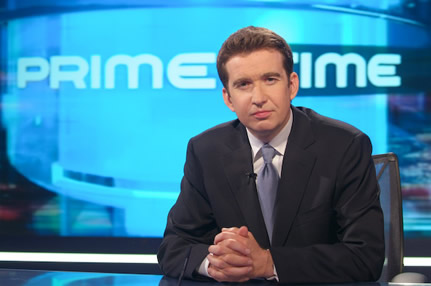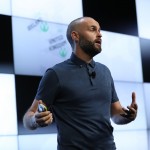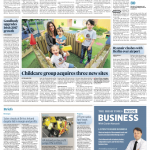Our interview this week is with award winning journalist and news presenter Mark Little. Mark has been working in RTE since 1991 where he started as a television reporter working on stories such as the Ben Dunne scandal before being assigned to the USA as RTE’s Washington reporter.
He worked as RTE’s Foreign Affairs Correspondent since 2001 covering the September 11th attacks and spent seven weeks in Iraq reporting on the war there. He received a Television Journalist of the Year award for his coverage of the Afghanistan conflict.
Mark is currently a presenter of RTE’s flagship current affairs programme, Prime Time and has written two books, Turn Left at Greenland and Zulu Time.
In our interview, Mark shares his thoughts on how Prime Time ticks, how he regards PR approaches and the effect of social media on how news is reported.
How does the Prime Time team decide on what to cover?
The process begins with an editorial meeting on Monday morning, where we do our post-mortem on previous week and review the big events likely to dictate our programming. But anything between 25 and 50 per cent of out output comes from reporters/presenters pitching specific ideas.
What kind of stories are you more likely to report on?
The story we feel we would be ashamed to have missed
What influence do daily newspapers and news programmes have on your reports?
More limited than it was when I first joined Prime Time but we still keep a very close eye on who is talking on TV and radio and scour the papers for the emergence of a new voice. Lately, I’ve been doing my own scouring of social media for ideas and people.
When seeking opinions on issues covered by the show, what makes you consider someone as an authority?
A huge variety of factors but a general confidence in their credibility as an advocate of a particular position and their ability to articulate that position is paramount
Do you think a report on Prime Time has any influence on how the issues are subsequently dealt with?
Public debate is a river with different currents and we are one of those currents.
How can PR people bring value to the Prime Time production team?
Solve a problem. Be honest. Think of the long-game. And in you don’t have absolute personal confidence in what you are offering then don’t make that call or send the e-mail. A show like ours has a long memory for people with integrity but we never forget the chancers.
What value do you place on press releases or press statements?
None. The only exception is a release in relation to a breaking story on programme day
Are you open to being pitched stories? Any advice you’d offer here?
Hate being ‘pitched’ but absolutely open to ideas from all quarters. We’d be failing if we weren’t seeking out as many views as possible. But again, this is a long game. Don’t make a short-term pitch that will damage your long term credibility
What advice would you give someone invited in for a studio interview? What makes a good interviewee?
Belief in yourself and what are you saying (something no media training course can help you with)
And remember, you’re not in that studio to impress your bosses or boardmembers or cabinet colleagues, You are there to communicate with good people with busy lives in living rooms across the country.
How would you describe your interviewing style?
I wouldn’t even try.
What are your most memorable Prime Time reports?
Leas Cross. US elections
Do you ever reference blogs when researching?
I check out all kinds of media
As a recent Twitter convert, how do you find the service for keeping you up-to-date on current affairs?
It is my first and last port of call now. It has become my own personal newswire thanks to the links it provides to unlimited sources. It is also easy to filter and cross-check. I operate on the assumption that it is not what you say on twitter that matters but who you follow
What other benefits are you deriving from Twitter?
The interaction has been so refreshing. I don’t think I have been more plugged in to a community than I am now.
How do you feel to being pitched to on Twitter?
Let’s leave the pitching aside, but I’m fascinated by innovative people and new ideas and change.
You are also a regular Boards.ie user. Does using boards.ie ever inform your research?
I primarily use it for interaction. But many of the reporters I work with use it for sourcing interviews and ideas
How to you find Boards and Twitter as barometers of public perception on current affairs?
They are invaluable for discussion and interaction and accountability but I don’t think they have a broad enough reach into Irish society to be a barometer of public opinion
Was it always your ambition to be a current affairs programme presenter?
That or centre-forward for Liverpool
What TV presenter do you most admire?
I don’t have any heroes.
What TV programmes do you like to watch?
I find myself watching a lot of TV news in the same way I eat broccoli. It’s good for me but I would probably rather be doing something else (like watching Jools Holland, The Wire, Sarah Silverman, John Stewart)
What newspapers and magazines do you regularly read?
What you got? I read them all. But less and less in actual newsprint and more online although I still feel a little thrill when the wife’s Vanity Fair drops through the letterbox with a thud
Do you have an opinion on the new versus traditional and the future of TV?
It’s like having an opinion on the tide. New will completely transform old. TV will survive but it will become just another platform for content
As a former Malahide Sea Scout did you ever notice shaky foundations in coastal transportation infrastructure?
No. I was too busy chasing Girl Guides

Prime Time's Mark Little






Nick McGivney Nov 05 , 2009 at 1:53 pm /
Killer final q